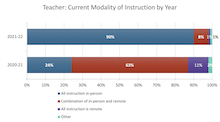Press Release:
Survey Finds Public Schools Aren’t Abandoning Digital Resources Despite Return to In-Person Instruction
Download report: Coming Back Together: Educational Resources in U.S. K-12 Education, 2022
Download infographic: Coming Back Together infographic

Satisfaction with Digital Materials Remains High, While Widespread Familiarity Remains Low
OAKLAND, CA, USA, June 30, 2022/EINPresswire.com/ -- While almost all teachers have returned to their classrooms this school year, their reversion to textbooks and other physical instructional materials they preferred before the pandemic hasn’t been nearly as swift, an annual survey of educators by Bay View Analytics found.
More than nine in 10 teachers reported having returned to in-person instruction. But only 30 percent of teachers report their instructional materials are entirely or predominantly physical, down significantly from 2018-19 prior to the pandemic when 68 percent said physical materials were the norm.
The largest group of teachers (42 percent) reported an even split among digital and physical materials compared to 20 percent pre-pandemic.
“Pandemic teaching disrupted K-12 schools. After returning to the classroom this year, teachers and administrators are figuring out what methods used during remote teaching should stick around. It may take a few years for classrooms to settle post pandemic,” said Julia Seaman, Director of Research at Bay View Analytics and author of the report. “However, it is quite clear that completely physical textbooks and materials are now things of the past – including digital resources in the classroom will be the standard going forward.”
Bay View Analytics in partnership with the Online Learning Consortium and funded by the William and Flora Hewlett Foundation surveyed a nationally representative sample of 1,469 U.S. teachers and administrators in April 2022. This year’s study is the fourth in a series investigating K-12 curricula discovery, selection and adoption processes in the United States.
The continued use of digital materials comes despite most teachers (61 percent) saying they prefer to use physical materials and nearly the same number (59 percent) expressing a belief that students learn better with physical materials. However, most teachers (55 percent) also believe that their students prefer digital materials.
While teachers are using digital materials more, many remain unfamiliar with a common form of those materials called open educational resources (OER). OER are teaching, learning and research materials that are either in the public domain or licensed in a manner that provides everyone with free and perpetual permission to engage in the “five R” activities (retain, reuse, revise, remix and/or redistribute them). Half of all teachers are unaware of OER at any level. For the half of teachers who are aware, many are at a low level of awareness: 19 percent have “heard of” OER, and 14 percent are “somewhat aware.”
The complete report, Coming Back Together Educational Resources in U.S. K-12 Education, 2022, is released under a Creative Commons license and is available for download at https://www.bayviewanalytics.com/reports/k-12_oer_comingbacktogether.pdf. An associated infographic is available at https://www.bayviewanalytics.com/reports/k-12_oer_comingbacktogether_infographic.pdf. The study also examined educators’ views on curriculum adoption and professional development.
The full series of reports for this project, including reports on higher education, are available on the OER section of the Bay View Analytics webpage, https://www.bayviewanalytics.com/oer.html.
About Bay View Analytics
Bay View Analytics is a statistical research firm focusing on survey design, implementation and analysis. Formerly known as the Babson Survey Research Group, the scope of Bay View Analytics' consulting engagements includes scientific statistical analyses, clinical trial statistics and survey designs for a range of topics, with a particular focus on online education. Bay View Analytics has been conducting research and publishing annual reports on the state of online education in U.S. higher education for thirteen years. Visit www.bayviewanalytics.com for more information or contact us at info@bayviewanalytics.com.
About Online Learning Consortium
The Online Learning Consortium (OLC) is a collaborative community of education leaders and innovators, dedicated to advancing quality digital teaching and learning experiences designed to reach and engage the modern learner – anyone, anywhere, anytime. The growing OLC community includes faculty members, administrators, trainers, instructional designers and other learning professionals, as well as educational institutions, professional societies and corporate enterprises. Visit onlinelearningconsortium.org for more information.
Recent Publications
Open Educational Resources
- Approaching a New Normal? Educational Resources in U.S. Higher Education, 2024
- Conflicted Digital Adoption: Educational Resources in U.S. K-12 Education, 2024
- Research Brief: Digital and OER Textbook Adoption
- Research Brief: Faculty Satisfaction with Course Materials varies by Publisher
Course Material Affordability
Digital Learning Pulse Surveys
- Infographic: 2023-2024 Digital Learning Pulse Survey
- The Digital Transformation of the Community College
- Planning for a Smaller Future: Dealing with Declining Enrollments
STEM
- Teaching Online: STEM Education in the Time of COVID
- What Makes a STEM Student
- Perceptions of the Future of STEM Education
Distance Education
- Digital Faculty: Faculty Social Media Use and Communications
- Infographic: Digital Faculty
- Grade Increase: Tracking Distance Education in the United States
Follow us on
Privacy
All survey respondents are provided complete anonymity. No personally identifiable information is released. Full privacy policy.